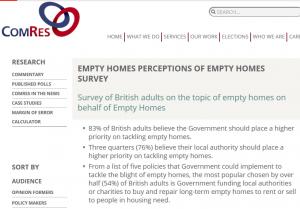
Find more posts
Poll shows strong support for government action on empty homes
Latest
November 28, 2016



Charity Empty Homes has launched Empty Homes Week by announcing the results of a poll that show a strong desire amongst the public for the goverment to do more about the issue of empty homes.
The Press Release reads as follows:
Strong public support for the Government to place a greater priority on tackling empty homes
To coincide with the start of National Empty Homes week (28th November to 2nd December), new research from the national campaigning charity, Empty Homes, has found that over four in five (83%) British adults believe the Government should place a higher priority on tackling empty homes. This has increased five percentage points in the two years since Empty Homes last commissioned ComRes to put the same question to the public.
Two in five (39%) say that empty homes are a blight on their local area, and three quarters (76%) believe their local authority should place a higher priority on tackling empty homes.
Of the potential policies we tested in our survey, the most popular solution to tackling the blight of empty homes is for the Government to fund either local authorities or charities to buy and repair long-term empty homes to rent or sell to people in housing need.
The Empty Homes Charity is calling on the Government to adopt a new empty homes strategy to ensure that more affordable housing can be created from empty properties alongside the drive to build new homes; and to address the causes and blight of very high levels of empty homes in some areas.
Key findings:
- More than four fifths of British adults (83%) think the Government should place a higher priority on tackling empty homes.
- A substantial majority (78%) agree that the Government focuses too much on building new homes, and not enough on bringing empty homes back into use.
- Over three quarters of British adults (76%) believe their local authority should place a higher priority on tackling empty homes — similar to the previous survey in 2014, where 74% of British adults said the same.
- Two in five (39%) say that empty homes are a blight on their local area, compared to 36% in 2014.
- From a list of five policies that Government could implement to tackle the blight of empty homes, the most popular chosen by over half (54%) of British adults is Government funding local authorities or charities to buy and repair long-term empty homes to rent or sell to people in housing need. In equal second place (both chosen by 47% of British adults) is providing financial assistance to first time buyers to enable them to buy and restore long-term empty homes and making it easier for local authorities to purchase long-term empty homes where the owners refuse to bring them into use.
- Respondents in social groups C2 and DE are more likely than social group C1 in particular and social groups AB to see empty homes as a blight in their area. British adults in social grade C1 are less likely than those in C2 and DE to agree that the Government focuses too much on building new homes, and not enough on bringing empty homes back into use.
- There is strong support across the whole political spectrum for a priority to be given to tackling empty homes. Based on British adults' reported vote in the 2015 General Election, voters for each of the major parties are similarly likely to say that empty homes are a blight in their area, (UKIP 45%; Labour 42%; Conservative 39%).
- Over two in five (41%) British adults say that higher council tax for property owners who keep their homes empty for a year or more is among the policies they would most like the government to implement. Almost a third of people (31%) support policies to make it harder for people to buy properties which they then leave unoccupied.
